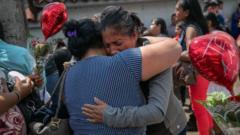Trump, DOGE would make a huge mistake waging war on remote work

The Trump administration’s proposal to force federal employees back into the office full-time has sparked widespread debate and concerns about inefficiency and waste.
The plan, as articulated by entrepreneur and former presidential candidate Vivek Ramaswamy, is designed to shrink the federal workforce by compelling mass resignations through in-office work mandates.
Ramaswamy, whom President-elect Donald Trump has tapped to co-chair the new Department of Government Efficiency, or "DOGE," with Elon Musk, explained during an interview with Tucker Carlson that this strategy would reduce bureaucracy by making federal positions less appealing to those who prefer flexible work arrangements.
But this is a terrible idea. Far from increasing efficiency, it threatens to waste taxpayer dollars and undermine the government’s ability to serve the public effectively, as the latest Office of Management and Budget report suggests.
Carlson expressed skepticism that the federal workforce could be significantly reduced, noting that strong job protections make it difficult to fire federal employees outright. Ramaswamy dismissed these concerns, stating that the mass resignations would occur naturally if remote work privileges were rescinded. He suggested that this “radical idea” would lead to the voluntary departure of approximately 25 percent of federal workers, thereby reducing the payroll budget without the need for direct terminations.
“If you literally just mandated that they have to show up for work, Monday through Friday, a radical idea, a good number of them would quit that way,” Ramaswamy said, arguing this would also reduce unnecessary regulatory burdens and streamline operations.
This plan rests on the assumption that the loss of workers would translate into cost savings. With the federal payroll totaling $110 billion, proponents of the policy argue that a reduction in headcount would result in a leaner, more efficient government.
Yet in reality, this proposal is very short-sighted. Payroll for 2.2 million federal employees represents only 1.8 percent of the federal government's $6.1 trillion budget. Mass resignations would therefore result in minimal savings and lead to critical skill shortages in important agencies requiring specialized expertise, such as Homeland Security.
Recruitment and training of replacements would not only delay the restoration of full operational capacity but also incur significant costs, likely offsetting any expected savings. Moreover, an exodus of experienced personnel would disrupt ongoing projects, reducing the quality and efficiency of government services.
Ramaswamy's proposal also dismisses the documented success of remote work in the federal sector. During the COVID-19 pandemic, telework allowed agencies to maintain productivity while reducing overhead costs associated with maintaining fully staffed physical offices, according to OMB’s findings. This transition proved that flexible work arrangements could sustain and even enhance operational efficiency.
Reversing this progress, as Ramaswamy suggests, would require significant reinvestment in office infrastructure, including utilities, maintenance and security. These additional expenses would negate much of the anticipated payroll savings and ultimately burden taxpayers with unnecessary costs.
Ramaswamy further justified the plan by linking it to broader goals of regulatory reform. He argued that a reduction in the workforce would allow for a dramatic rollback of federal regulations, claiming that up to 50 percent of existing rules could be deemed invalid if they were written by unelected officials. Although this rhetoric may resonate with those frustrated by federal bureaucracy, it ignores the complexities of governance and the value of institutional expertise. Federal employees are not merely rulemakers — they are also the executors of policies passed by Congress. Their work ensures the smooth functioning of programs that millions of Americans rely on daily, from Social Security benefits to disaster response.
The human and economic costs of this policy would also extend beyond the federal workforce. Morale among remaining employees would likely plummet as workloads increase and institutional knowledge dissipates. This could lead to further attrition and a self-reinforcing cycle of greater inefficiency. Industries reliant on federal oversight might also face disruptions, with businesses and state governments bearing the brunt of delays and mismanagement. These ripple effects would significantly diminish the effectiveness of federal spending, exacerbating waste rather than curbing it.
Rather than adopt a one-size-fits-all approach to workforce reduction, the federal government should prioritize targeted reforms that enhance efficiency without sacrificing service quality.
Modernizing outdated processes, leveraging technology and embracing the benefits of remote work could achieve meaningful cost reductions while maintaining operational integrity. Ramaswamy’s suggestion that agencies could simply operate with fewer employees overlooks the nuances of federal functions and the risks associated with gutting critical programs.
Forcing federal employees back to the office with the intent of provoking resignations is a deeply flawed strategy. Far from creating a leaner and more efficient government, it risks undermining the very institutions that keep the nation running.
By prioritizing optics over outcomes, this proposal would lead to increased waste, disrupted services and diminished public trust. In a world where flexible work has demonstrated its value, clinging to outdated workplace policies is not only inefficient but also economically reckless.
Gleb Tsipursky, Ph.D., serves as the CEO of the hybrid work consultancy Disaster Avoidance Experts and authored the best-seller "Returning to the Office and Leading Hybrid and Remote Teams."
Topics
-
The 'huge mistake' 1 in 13 homeowners are making with their money
Business - CNBC - October 29 -

GOP senator: Using military for deportations would be 'huge mistake'
Politics - The Hill - 6 days ago -

Trump’s shake-up of EV rules would be ‘huge positive’ for Tesla
Business - Financial Times - November 14 -

Make no mistake: this Trump presidency will continue to attack abortion rights | Moira Donegan
World - The Guardian - November 12 -

Governments are ignoring their own workers' voices on remote work
Politics - The Hill - November 19 -

Is the pendulum swinging back in favor of remote working?
Tech - VentureBeat - November 19 -

Trump has pledged to wage war on planet Earth – and it will take a progressive revolution to stop him | George Monbiot
World - The Guardian - November 7 -

Trump proposes eliminating the income tax. Here's what experts think.
Top stories - ABC News - October 28 -

How would Trump’s promise of mass deportations of migrants work?
Top stories - BBC News - November 8
More from The Hill
-

John Phelan nominated to lead Navy under Trump
Politics - The Hill - 3 hours ago -

Jamieson Greer selected as Trump's United States Trade Representative
Politics - The Hill - 3 hours ago -

Jim O’Neill selected to lead HHS alongside RFK Jr. as deputy
Politics - The Hill - 4 hours ago -

Trump completes health team with Jay Bhattacharya as NIH pick
Politics - The Hill - 4 hours ago -

Trump taps Kevin Hassett as National Economic Council head
Politics - The Hill - 5 hours ago